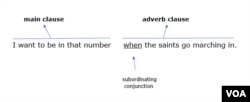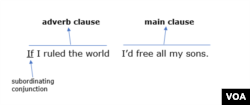In the song "When The Saints Go Marching In," jazz musician Louis Armstrong sings about entering heaven:
Yes, I want to be in that number
When the saints go marching in
Armstrong is expressing his desire to be among the saints going to heaven. The line “when the saints go marching in” is an adverb clause – sometimes called an “adverbial clause.”
Adverb clauses are dependent clauses that act as adverbs – they modify a verb, or adjective or another adverb. Like all clauses, adverb clauses contain a subject and a verb.
By now, you have all used adverb clauses every day in your English speaking and writing. For example, when you tell someone what happens when, before, after, because or if something else happens, you are using adverb clauses. We hear or read adverb clauses everywhere English is spoken or written, including in entertainment.
Adverb clauses show relationships between events, actions or ideas. They use signal words called “subordinating conjunctions” to indicate the type of relationship.
For example, in the line “when the saints go marching in,” the subordinating conjunction when tells us there is a time relationship to the main clause “I want to be in that number.”
There are four main types of adverb clauses: time, cause, contrast and condition.
Time Clauses
Let’s continue with adverb clauses of time – often called “time clauses.”
You heard the jazz example using the conjunction when. There are more than a dozen additional conjunctions that introduce time clauses.
Some common ones include: before, after, since, while and until.
Listen to an example with after:
After I left work yesterday, we checked out the new art market.
The time clause is “After I left work yesterday.” The subject is I and the verb is left. And the main clause is “we checked out the new art market.” The subject is we and the verb is checked out.
Most adverb clauses keep the same meaning when the position of the adverb clause and main clause are changed in a sentence.
For example, the sentence “After I left work yesterday, we checked out the new art market” has the same meaning as “We checked out the new art market after I left work yesterday.”
The only difference is punctuation. When the adverb clause comes before the main clause, use a comma.
For the rest of the program, listen to the example sentences and take mental note of their subjects and verbs. Each sentence will have two subjects and two verbs.
Contrast
OK, let’s move on to adverb clauses of contrast. These adverb clauses present an unexpected result between the information in the adverb clause and main clause.
In his song “I Still Love You,” British pop singer Terrence Trent Darby uses the contrasting conjunction though in an adverb clause:
And though we may not stay together
I still love you
Here, “though we may not stay together” is the adverb clause and “I still love you” is the main clause; it gives the unexpected result.
Two other common conjunctions for contrast clauses are although and even though – which also mean “despite the fact that.”
Although is more formal than though, which is very common in spoken English. For added emphasis, we use even though.
Note however that, when the although- or though-clause comes after the main clause, it can mean “but.” Listen:
I’ll be in New York in June although I’m not sure which days.
However, for this meaning, we often put though at the end of a sentence and it is not part of an adverb clause. Listen:
I’ll be in New York in June. I’m not sure which days, though.
Cause
Now onto cause- clauses, also called “reason- clauses.” These adverb clauses show us the reason or cause for something. And, the main clause gives the result. Some common subordinating conjunctions are: because, since, as and so.
Because- clauses are used when the reason is not yet known to the listener. Listen for the cause in the adverb clause and the result in the main clause:
He stayed awake until midnight because he had to finish his report.
The because- clause “because he had to finish his report” shows the cause and the main clause “He stayed awake until midnight” gives the result.
As- and since- clauses are used when the reason is already known to the listener. But as and since are somewhat formal. For everyday spoken English, we often replace those words with the conjunction so. Listen to two examples – one using since...
Since it’s sunny today, we can ride our bikes in Central Park.
...and one using so:
It’s sunny today so we can ride our bikes in Central Park.
When we use a so- clause to connect a cause to its result, the so- clause must come second.
And note something else: the cause in a so-clause does not contain the conjunction so; instead the main clause does.
Condition
And finally, we have conditional clauses, also called “conditionals” or “if clauses.” You will remember our past programs on conditionals, so we won’t spend too much time on them.
As you’ll recall, conditional clauses show that one thing must be true for something else to be true. In the song “If I Ruled the World,” American rappers Nas and Lauryn Hill imagine a different world:
If I ruled the world
(Imagine that)
I'd free all my sons
I love them love them, baby
Note that many conditional clauses use conjunctions other than if, such as unless, in case and whether. And, in very formal written English, the conjunctions were and should often replace if.
OK, now let’s return to your mental notes. Did you find the subjects and verbs in the adverb clauses and the subjects and verbs in the main clauses?
Write your findings in the comments section.
I’m Alice Bryant.
Alice Bryant wrote this story for Learning English. Caty Weaver was the editor.
________________________________________________________________
Words in This Story
heaven – n. the place where God lives and where good people go after they die according to some religions
saint – n. a person who is officially recognized by the Christian church as being very holy because of the way he or she lived
modify – v. to change some parts of (something) while not changing other parts
entertainment - n. something affording pleasure, diversion or amusement, especially a performance of some kind
dozen – n. a group of 12 people or things
switch – v. to make a change from one thing to another
punctuation – n. the marks in a piece of writing that make its meaning clear and that separate it into sentences or clauses
contrast – n. something that is different from another thing
despite – prep. without being prevented by something
emphasis – n. special importance or attention given to something








